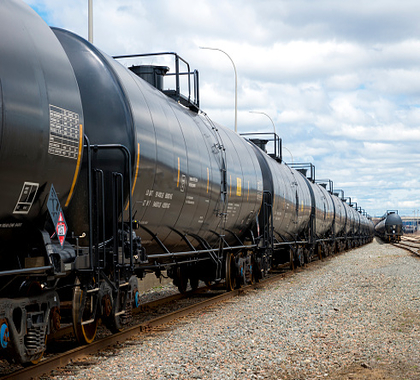A bill in Washington State that offers new vapor pressure limits on Bakken crude oil transported through the state is now under consideration in the state’s House of Representatives. These proposed limits are based on false information and junk science that suggest Bakken crude is inherently more dangerous than other kinds of crude. If passed, this regulation would bring Bakken crude rail shipments to a halt, negatively impacting not only Washington’s economy, but also North Dakota, Montana, and others.
Under the provisions in the bill, facilities would be prohibited from loading or unloading any crude unless the oil has a vapor pressure of less than 9.0 psi, well below the current 13.7 psi that was established by regulators in 2015 and the national standard of 14.7. This would create a considerable cost barrier for producers, as they would not only need to invest in new and expensive equipment to reach this pressure level, they would also be forced to remove certain qualities of the crude, making it less valuable to refiners.
The arguments made in favor of the legislation do not hold up when compared to the available science. Multiple independent studies have shown that Bakken crude is similar to other North American light crude oil in every category: vapor pressure, gravity, flash point, and initial boiling point. The average vapor pressure of Bakken crude is 11.5–11.8 psi, which is nearly the same as the average vapor pressure of other crudes and is well below the 43.5 psi threshold for liquids under the hazardous materials regulations. A study conducted by the American Fuel and Petrochemical Manufacturers found that Bakken crude poses no significantly different risks than other crudes or flammable liquids transported by rail.
Construction of pipeline infrastructure has faced major roadblocks, including organized public opposition and legal battles. As a result, rail has become a significant mode of crude transport. According to the Washington State Department of Ecology, more than 90 percent of oil-by-rail shipments through Washington State are carrying Bakken crude. As much as 150,000 barrels per day of North Dakota crude is currently shipped through Washington State. If the proposed legislation were to pass, this flow would be halted and redirected.
Some might think this burdensome regulatory measure would force Washington State refineries to seek shipments of crude from other states, such as Colorado, New Mexico, Texas, and Wyoming. But these shipments will likely never arrive either, as crude producers from these states will find themselves facing the same, crushing regulatory measures as those now being considered for North Dakota producers. Crude extracted from basins in the aforementioned states, have tested at similar vapor pressure as crude from Bakken. Washington State would soon find itself dependent on crude imports from overseas, threatening not only energy security, but also national security.
Washington State is a major center for oil refineries, holding the fifth-largest refining capacity in the nation. Washington is the third-largest exporter among the states, and it is a major hub for crude exports because of its extensive port facilities. Petroleum is the fifth-largest export product for Washington, carrying nearly $1 billion in economic impact.
Washington should consider the cost to its own economy with these potential regulations, as well as the unreasonable burden that would be placed on other states like North Dakota, heavily infringing on interstate commerce.
For more information on Bakken crude and oil-by-rail transport, see the following resources:
API: Rail Transportation Today
https://www.api.org/oil-and-natural-gas/wells-to-consumer/transporting-oil-natural-gas/rail-transportation/rail-transportation-today
API notes the U.S. freight system is the most efficient and cost-effective in the world, and that rail has become an increasingly relied upon mode of energy transportation across the United States. The boom in Bakken crude oil production and a lack of pipeline infrastructure have led to producers relying on the transportation of crude oil by rail.
North American Shale
http://northamericanshalemagazine.com/articles/709/bakken-crude-characteristics-and-crude-by-rail-myth-vs-fact
This article by the North Dakota Petroleum Council explains the myths and facts about Bakken crude oil, dispelling, among other false assertions, claims that Bakken crude is more volatile than other kinds of crude.
IER: Bakken Oil Fact Sheet
http://instituteforenergyresearch.org/wp-content/uploads/2012/08/Bakken-Fact-Sheet.pdf
The Institute for Energy Research lists the major economic benefits of Bakken crude oil production and its role in replacing declining production levels in Alaska and California.
North Dakota Petroleum Council Study on Bakken Crude Oil Properties
https://www.ndoil.org/wp-content/uploads/Bakken-Quality-Report.pdf
The North Dakota Petroleum Council commissioned an independent study on the quality and properties of Bakken crude. The report finds that average vapor pressures of Bakken crude are between 11.5-11.8 PSI, the same as other light crudes.
American Fuel and Petrochemical Manufacturers: A Survey of Bakken Crude Oil Characteristics Assembled for the U.S. Department of Transportation
https://www.afpm.org/uploadedFiles/Content/documents/Survey-of-Crude-Oil-Characteristics.pdf
This study released by the American Fuel and Petrochemical Manufacturers compared multiple samples of crude oil from different basins. The study finds no significantly increased risk in transporting Bakken crude than any other type of crude.
Nothing in this Research & Commentary is intended to influence the passage of legislation, and it does not necessarily represent the views of The Heartland Institute. For further information on this subject, visit The Heartland Institute’s website and PolicyBot, Heartland’s free online research database.
The Heartland Institute can send an expert to your state to testify or brief your caucus; host an event in your state; or send you further information on a topic. Please don’t hesitate to contact us if we can be of assistance! If you have any questions about this issue or The Heartland Institute’s website, you can contact George Jamerson, director of government relations, at [email protected] or 804-317-8837.



